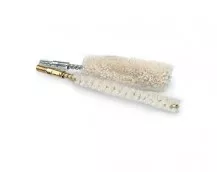Cylindrical brushes play a big part in many machines. From floor scrubbers to industrial cleaners, they help get jobs done fast. But when they stop working right, everything slows down. If you’re always replacing them or not getting the results you want, it’s time to take a closer look. This guide breaks it down in a simple way, helping you spot common problems. If you're searching for a trusted cylindrical brush supplier, these tips can also help you pick the right one.
Is the Brush Material Right for the Job?
Brushes are made from different materials like nylon, polypropylene, or wire. Each one is meant for a certain type of task. If you're using a brush made for light cleaning on rough floors, it won’t last long. The bristles might break or wear out fast.
What to check:
- Are the bristles bent or worn down?
- Do they feel too soft or too hard on the surface?
- Is the cleaning not as strong as it used to be?
Matching the right brush material to your job is the first step to better performance.
Are You Using the Correct Speed?
If your machine spins too fast, it can cause the brush to wear out quickly. High speed might seem better, but it creates too much heat and friction. That leads to broken bristles and damage to the surface.
What to check:
- Is the brush getting hot after just a few minutes?
- Are there burn marks on the floor or surface?
- Does it sound louder than usual when running?
Slowing down your machine a bit could make a big difference.
Are You Cleaning the Brushes Often?
Even the best brush won’t last long if it’s always full of dirt and dust. Dirt gets stuck between the bristles and makes the brush less effective. It also wears out the brush faster.
What to check:
- Do the bristles look clogged?
- Are there particles stuck inside the brush?
- Is the brush harder to spin than before?
Washing and drying your brush after use can keep it in better shape.
Is the Brush Aligned Properly?
If the brush is not placed the right way in the machine, it won’t clean evenly. This can lead to one side wearing down faster than the other. Over time, this uneven wear ruins the whole brush.
What to check:
- Is one side of the brush more worn than the other?
- Does the brush shake when the machine runs?
- Are there unclean streaks left behind?
Making sure the brush is aligned correctly will help it last longer and clean better.
Are You Using the Right Pressure?
Pressing down too hard while using the machine can damage the brush. People often think more pressure means better cleaning, but it actually wears down the bristles faster and can harm surfaces.
What to check:
- Are the bristles flattening out?
- Does the brush leave scratches behind?
- Are you forcing the machine to move?
Letting the brush do the work is the smarter way to clean.
Is the Brush Just Old?
Brushes have a life span. If yours has been in use for a long time, it might be time for a new one. Even if it looks okay, the bristles may not clean the way they used to.
What to check:
- Are the bristles shorter than before?
- Does it take longer to clean the same area?
- Is the brush making strange noises?
Sometimes, replacing an old brush is the only fix.
Is the Machine Damaging the Brush?
If your machine is not working right, it can damage even a brand-new brush. A broken motor or a misaligned holder can wear out the brush quickly.
What to check:
- Are other parts of the machine in good shape?
- Does the brush fit tightly in its holder?
- Are you seeing damage only on one side?
Fixing the machine may save your next brush from getting ruined too soon.
Still Having Issues? Time to Talk to the Experts
If you’ve gone through this list and your brushes still fail often, it might be time to call a cylindrical brush supplier. A good supplier can help you pick the right brush, explain how to use it properly, and even spot other problems you might be missing.
Don’t Forget About Other Types of Brushes
While checking your cylindrical brushes, don’t forget other tools like gun cleaning brushes. These also need care and proper use. If you’re not getting good results from them, similar tips apply: clean them often, use the right pressure, and replace them when they wear out.
Taking care of all your brushes, big or small, helps you get better results and save money. With just a few changes in how you use and care for your tools, you’ll notice a big difference in performance.
